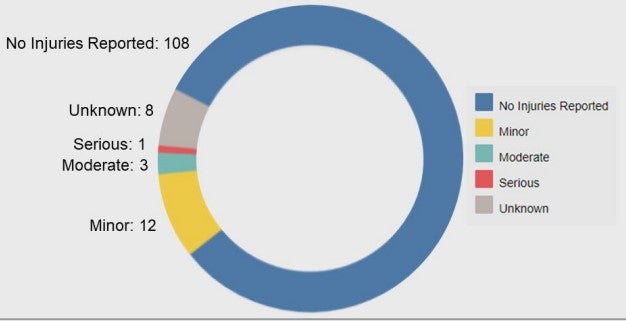Self-driving ride-hailing and autonomous trucking startup Waymo reported the most automated driving system (ADS) crashes over roughly the past year, according to a government report released on Wednesday aimed at creating more transparency into autonomous vehicle safety trends.
The “first-of-its-kind” data from the National Highway Traffic Safety Administration revealed 130 crashes in vehicles equipped with ADS technology reported by manufacturers and operators between June 29, 2021, when NHTSA issued an order requesting such data, and May 15, 2022. Waymo reported 62 of those crashes, two of which involved its class 8 heavy-duty trucks, a company spokesman told FreightWaves.
However, the agency noted that the report shouldn’t be used to compare the safety of different companies because it doesn’t account for the number of vehicles each company has deployed and other key factors.
NHTSA released a similar report documenting crashes involving vehicles equipped with Advanced Driver Assistance Systems. It plans to release updates monthly.
“The data released today are part of our commitment to transparency, accountability and public safety,” said NHTSA Administrator Steven Cliff.
“New vehicle technologies have the potential to help prevent crashes, reduce crash severity and save lives, and the Department is interested in fostering technologies that are proven to do so; collecting this data is an important step in that effort. As we gather more data, NHTSA will be able to better identify any emerging risks or trends and learn more about how these technologies are performing in the real world.”

Other self-driving truck technology companies reporting ADS crashes to NHTSA over the past year included Navistar and TuSimple, each with one crash. The remaining crashes were reported by companies specializing in passenger or delivery vehicles.
Waymo responds
“We see value in having nationally standardized and uniform crash reporting during this early stage of the development and deployment of autonomous driving technology, and there’s public benefit in NHTSA sharing its findings,” according to a statement from a Waymo spokesperson commenting on the findings.
“We also believe any reporting requirements should be harmonized across all U.S. jurisdictions to limit confusion and potentially enable more meaningful comparisons, and NHTSA’s effort is a step toward achieving that goal.”
The spokesperson pointed out that the company was not involved in any high-severity collisions. Most of the crashes occurred in San Francisco, the spokesperson noted, where the company is driving more than 100,000 miles per week.
In addition, Waymo chose not to classify certain information requested by NHTSA as confidential, “which stands in stark contrast to most of the other ADS companies included in the report, and validates our commitment to transparency.”
Since NHTSA began its ADS reporting requirements last year, one crash resulted in serious injuries and 108 of the crashes resulted in no injuries. Of the 130 ADS-reported crashes, 108 involved collisions with another vehicle and 11 involved a vulnerable road user, such as a pedestrian or cyclist.
Report limitations
NHTSA cautioned about some of the limitations of the report, including that it does not take into account the number of vehicles a manufacturer or developer has deployed or the vehicle miles traveled. “That information is held by manufacturers and not currently reported to NHTSA,” the agency stated. “Thus, these data cannot be used to compare the safety of manufacturers against one another.”
The Autonomous Vehicle Industry Association (AVIA), whose members include Waymo and TuSimple, said that NHTSA’s report is evidence of autonomous vehicle safety levels and strong testing and deployment procedures.
“Last year 42,915 people died in motor vehicle crashes, a 10.5% increase from the previous year,” said AVIA General Counsel Ariel Wolf. “We are continuing to assess the data and agree with NHTSA’s statement that policymakers and the public should be judicious when drawing conclusions.”







